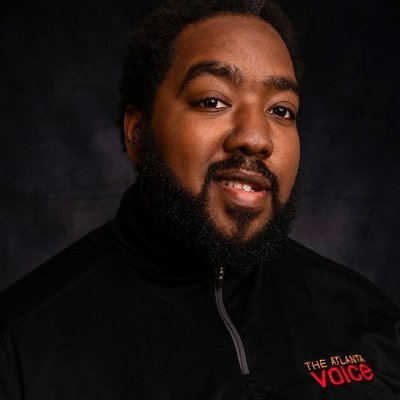Marshall Latimore, Trained in Page Design, Was 36
Black U.K. Journalists Blast U.K. Media on Racism
Iowa Reporter Acquitted in Press-Freedom Case
After McCammond Hire, AAJA Hits Condé Nast
The Day CBS Forgot That King Was a Preacher
. . . Mudd Knew Who Formed the Bedrock of D.C.
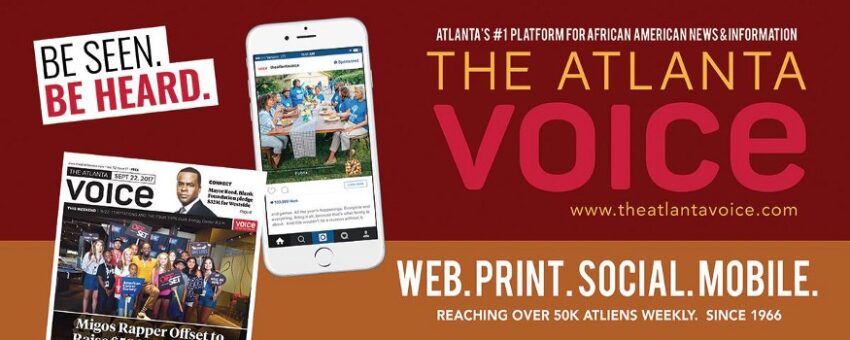
Marshall Latimore, Trained in Page Design, Was 36
Marshall A. Latimore, a visual journalist who was editor-in-chief and chief content officer of The Atlanta Voice, which calls itself “the largest circulated Black-owned newspaper in the greater Atlanta area,” was found dead in the city Wednesday, Atlanta police told Journal-isms. He was 36.
“On March 10th, 2021 around 12:52 pm, officers responded to a person down call at the location of [address],” the police statement said. “Upon arrival, officers located an unresponsive male who was not alert, not conscious, or breathing. Grady Ems [Grady Emergency Medical Services, an ambulance provider for medically related calls] pronounced the male deceased on scene and the decedent was removed by the Fulton County Medical Examiner who will lead the investigation to determine the cause of death.”
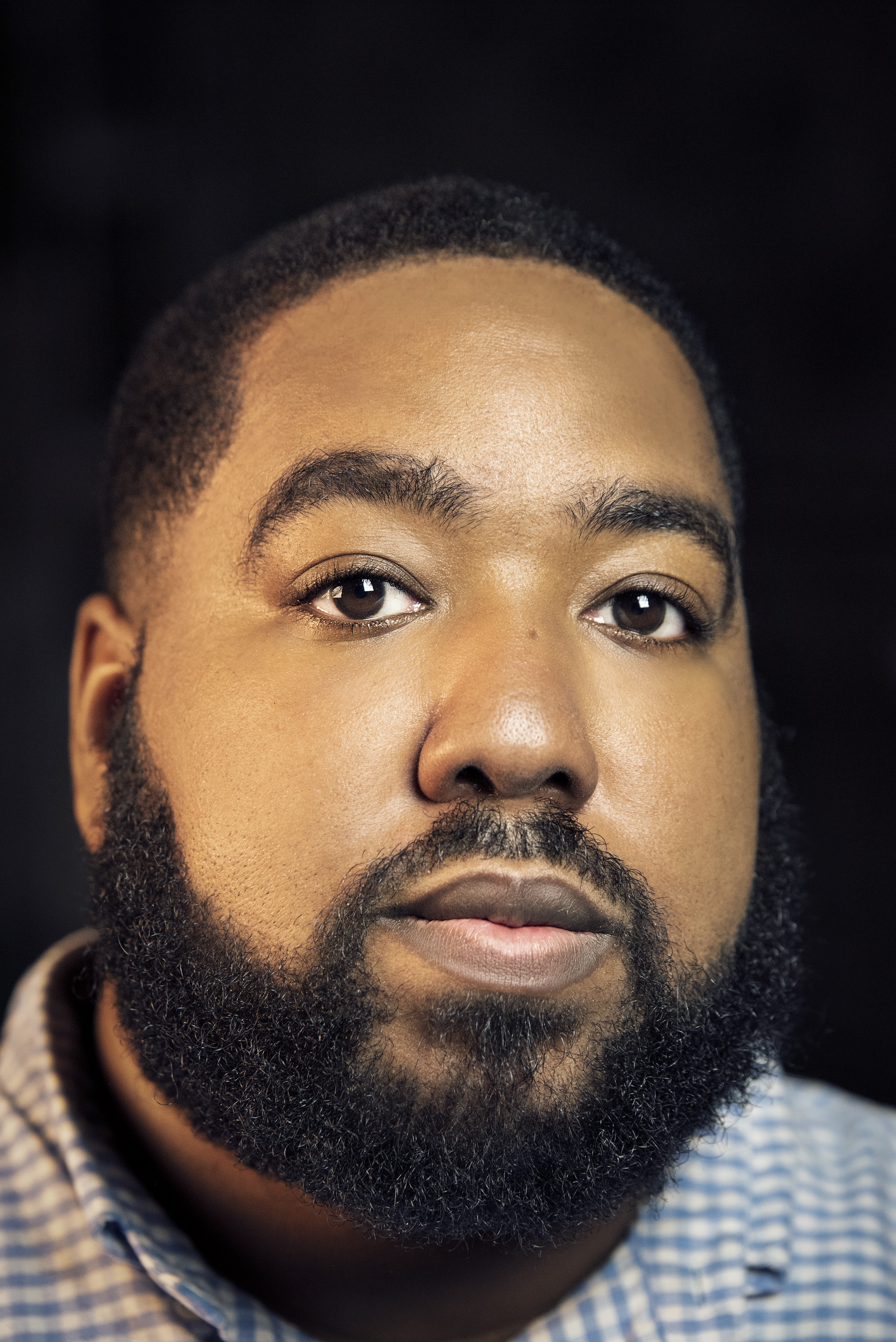 Latimore (pictured) described himself this way on his LinkedIn page: “A native of Birmingham, Ala., Latimore is an award-winning journalist, having received recognition for his work in the newspaper and magazine industries. In the last two years, he has also served in concurrent roles as a content coordinator for Best Version Media; a digital art director for the Houston Defender Media Group; executive editor for STAYONTHEGO Magazine; creative director for duGard Communications; and creative director for HBCUstory Inc.
Latimore (pictured) described himself this way on his LinkedIn page: “A native of Birmingham, Ala., Latimore is an award-winning journalist, having received recognition for his work in the newspaper and magazine industries. In the last two years, he has also served in concurrent roles as a content coordinator for Best Version Media; a digital art director for the Houston Defender Media Group; executive editor for STAYONTHEGO Magazine; creative director for duGard Communications; and creative director for HBCUstory Inc.
“Latimore also formerly worked as a 1A designer and special sections designer for more than 30 Gannett Co., Alabama Media Group and GateHouse Media publications throughout the Southeast, Midwest, New England and central California. He honed his skills in design, photography, video/audio editing at Tennessee State University in Nashville, where he studied journalism and speech communications.
“Latimore holds membership in a number of journalism organizations, including the National Association of Black Journalists, the Society for News Design, the National Newspaper Publishers Association and the Online News Association.”
The publication said in a Facebook posting, “We at #TheAtlantaVoice are coming to grips with the sudden and unexpected loss of our Executive Editor and Chief Content Officer, Marshall A. Latimore.
“Marshall stood in the epicenter of this Atlanta treasure as we have transformed The Atlanta Voice into a multi-media powerhouse set to grow our legacy for generations to come.
“His leadership cannot be replaced but his direction will be followed as our mission continues to be a voice for the voiceless. His presence will be missed but his voice will continue on in every aspect of our future.”
The Atlanta Voice is one of 10 Black-owned outlets that have joined forces with the Local Media Association to launch the Fund for Black Journalism, an initiative to reimagine and support the Black press. Others are the New York Amsterdam News, Houston Defender Network, Washington Informer, Dallas Weekly, The Afro, Michigan Chronicle, The Seattle Medium, Sacramento Observer and the St. Louis American.
The Voice was also one of 16 news outlets that received part of $2.4 million from the Racial Equity in Journalism Fund at Borealis Philanthropy. “Marshall wrote the grant. And truth be told, Marshall and the work he did to help bring the paper into the digital era is why we invested,” program officer Tracie Powell told Journal-isms.
In an interview in February 2019 with Zaria Gholston, a mass communications major at Georgia College, Latimore cited covering the gubernatorial campaign of Democratic candidate Stacey Abrams as being his most rewarding experience at the paper.
“ ‘I think we did over 120 headlines covering [Abrams’] campaign from start to finish. We were there when she actually qualified to be the first black woman to run for governor in the state of Georgia, and then we covered everything right up until she finally conceded to [Brian Kemp’s] campaign,’ Latimore said.
Latimore noted “that black publications are important platforms where people of color get to tell their stories, and are just as credible as other mainstream outlets, despite any setbacks they may face.
“ ‘A lot of times people look at the black press as not being as committed to the same level of accuracy, which [sometimes] that has been the case, but it has mostly been because of lack of resources,’ Latimore said.”
Latimore attended Tennessee State University from 2002 to 2011, and there he “honed his skills in design, photography, video/audio editing” and studied journalism and speech communications.”
He was part of the 2017 class for the Poynter-NABJ Leadership Academy for Diversity in Digital Media, “a transformational leadership program for journalists of color.”
- Jamila Wood, The Byline, Atlanta Association of Black Journalists: The Importance of the Black Press (scroll down
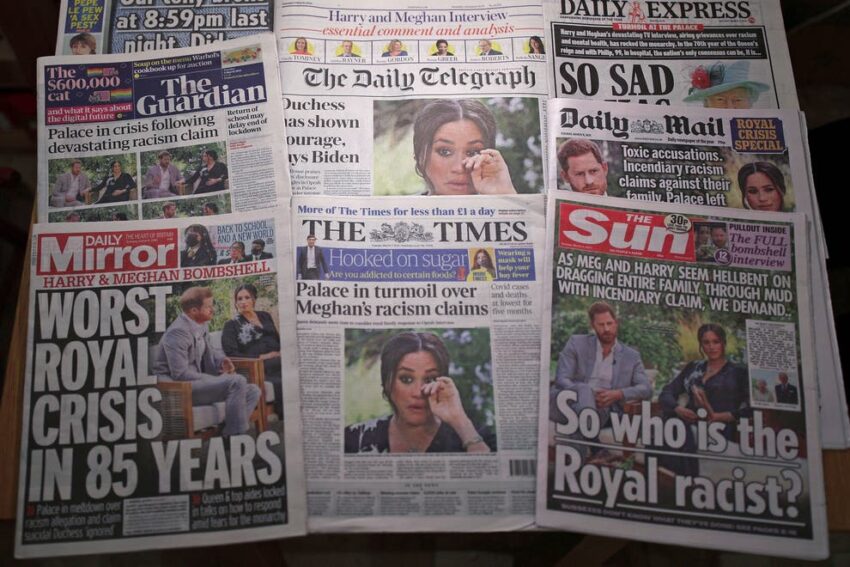
Black U.K. Journalists Blast U.K. Media on Racism
More than 200 British journalists, mostly of color, have rebuked a UK media industry body for claiming that racism played no part in coverage of Meghan, Duchess of Sussex, according to news reports Wednesday. In the fallout, the leader of the industry group, the Society of Editors, resigned.
The protesting journalists included a British correspondent for The New York Times and employees of The Guardian and Conde Nast. In addition, Charlene White (pictured below), the first Black woman to present the ITV News At Ten, pulled out of hosting the Society of Editors’ National Press Awards.
“Perhaps it’s best for you to look elsewhere for a host for your awards this year,” White said.
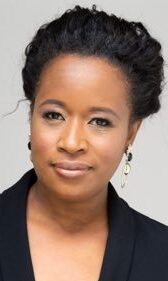 “Perhaps someone whose views align with yours: that the UK press is the one institution in the entire country who has a perfect record on race.”
“Perhaps someone whose views align with yours: that the UK press is the one institution in the entire country who has a perfect record on race.”
As Stephen Castle and Isabella Kwai reported Wednesday for The New York Times, “In the wake of Harry and Meghan’s explosive interview, an influential professional society speaking for the British news media issued a defiant response, rejecting the idea of racism and intolerance in British coverage of the couple.
“On Wednesday the group, the Society of Editors, was forced into an embarrassing about-face after objections from more than 160 journalists of color as well as the editors of both The Guardian and The Financial Times.
“On Monday, the society stated flatly that ‘The U.K. media is not bigoted,’ and accused Meghan and Harry of an unfounded attack on the profession.
“On Wednesday, it issued what it called a clarification, acknowledging that its initial statement ‘did not reflect what we all know: there is a lot of work to be done in the media to improve diversity and inclusion.’
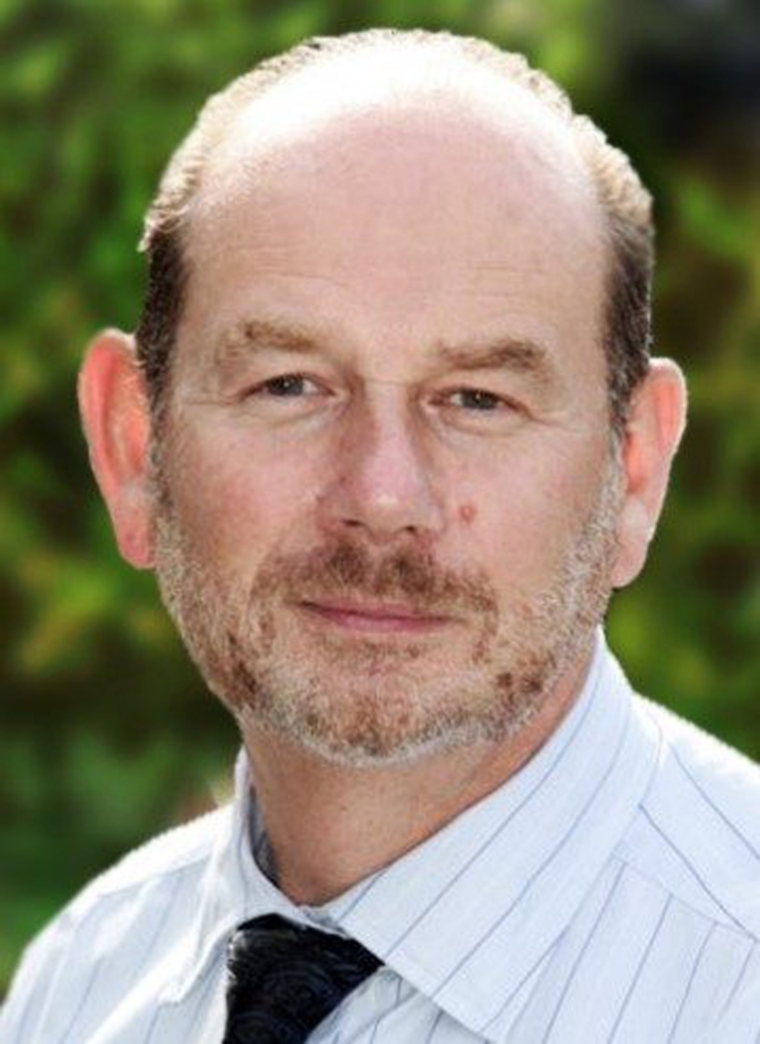 The Times also wrote, “Hours later, the group’s executive director, Ian Murray (pictured), resigned. Taking responsibility for the original statement, he said he was leaving ‘so that the organization can start to rebuild its reputation.’
The Times also wrote, “Hours later, the group’s executive director, Ian Murray (pictured), resigned. Taking responsibility for the original statement, he said he was leaving ‘so that the organization can start to rebuild its reputation.’
“The fallout from Harry and Meghan’s interview has not just divided Britons and shaken the foundations of the royal family. It has also created schisms in the British news media, an industry that rarely outwardly breaks ranks, and raised broader questions about racism in British society. . . “
The statement from the protesting journalists said, “While Meghan’s comments shone a light on her own personal experiences of discriminatory treatment, they reflect the depressingly familiar reality of how people from Black, Asian and minority ethnic backgrounds are portrayed by the UK press on a daily basis.
“Research by Women in Journalism based on a random week last year found that of 111 voices who were quoted on the front pages of British newspapers in a week, just one belonged to a black person. Of the 174 bylines on the stories featured that week, not a single one was black, and only six were written by reporters from other ethnic minorities.
“The Society of Editors has a poor record on diversity in relation to its awards — often nominating the same people year after year and producing many all male, all white shortlists. Even in this year of Black Lives Matter and the disproportionate impact of Covid it has not nominated a single non-white person in either of its columnist of the year shortlists. Additionally, the shortlist for its ‘Driving Diversity’ award includes some of the organisations which are the worst offenders when it comes to reporting on people from a Black, Asian and minority ethnic background.
“The Society of Editors should have used the comments by the Sussexes to start an open and constructive discussion about the best way to prevent racist coverage in future, including through addressing lack of representation in the UK media, particularly at a senior level. The blanket refusal to accept there is any bigotry in the British press is laughable, does a disservice to journalists of colour and shows an institution and an industry in denial. . . .”
- Karen Attiah, Washington Post: How two Black women took down whatever fantasies remained about the British monarchy
- Farah Stockman, New York Times: Why Are We So Obsessed With Royalty?
- Vanessa Williams, Washington Post: The paper bag test came to Buckingham Palace
 Des Moines Register reporter Andrea Sahouri was pepper sprayed and arrested while reporting on a clash between protesters and police. (Credit: Des Moines Register)
Des Moines Register reporter Andrea Sahouri was pepper sprayed and arrested while reporting on a clash between protesters and police. (Credit: Des Moines Register)
Iowa Reporter Acquitted in Press-Freedom Case
“An Iowa jury acquitted a journalist on Wednesday in a highly unusual trial of a reporter who was arrested last spring as she covered a protest against racism and police violence,” Katie Robertson and Rachel Abrams reported for The New York Times.
“Andrea Sahouri, a public safety reporter for The Des Moines Register, was arrested May 31 while covering a sometimes chaotic demonstration near the Merle Hay Mall in Des Moines. Police officers ordered protesters to disperse and used pepper spray against them. Ms. Sahouri, who said she had identified herself as a reporter, was arrested along with her boyfriend at the time, Spenser Robnett, who had accompanied her that day. . . .”
- Ryan W. Miller and William Morris, USA Today: Important victory for the First Amendment’: Iowa journalist Andrea Sahouri acquitted in rare trial of reporter
- Reporters Committee for Freedom of the Press: Iowa jury finds Des Moines Register reporter Andrea Sahouri not guilty on all charges: “No journalist should be arrested or prosecuted simply for doing their job,” said RCFP Executive Director Bruce Brown
 Alexi McCammond, incoming editor in chief of Teen Vogue, apologized once again for her 2011 tweets.
Alexi McCammond, incoming editor in chief of Teen Vogue, apologized once again for her 2011 tweets.
After McCammond Hire, AAJA Hits Condé Nast
“In light of the controversy over past tweets of the incoming Teen Vogue editor in chief, the Asian American Journalists Association (AAJA) and our Young Professionals Network call on Condé Nast to publicly, forcefully and concretely show its commitment to fair, accurate and comprehensive coverage of Asian American and Pacific Islander (AAPI) communities, and to ensure a safe and inclusive workplace for its AAPI employees,” Jessica Xiao wrote Wednesday for the Asian American Journalists Association.
“We want to see that Teen Vogue and its new leader develop and share specific strategies and goals to ensure that AAPI communities are accurately reflected in their newsroom and in their coverage — and that Condé Nast will fully empower the leadership to put those plans into action.
“After Condé Nast publicly announced Alexi McCammond as Teen Vogue’s editor in chief, tweets resurfaced showing that in 2011, McCammond had used racist anti-Asian stereotypes. In 2019, McCammond tweeted an apology and deleted the tweets. After a group of employees rightfully raised concerns this week, she told the Teen Vogue staff that there is no excuse for her tweets.
“We denounce the racist tweets. But we also believe that there is room for everyone to acknowledge, learn and grow from past mistakes. We support the long overdue appointment of more journalists of color and women for top leadership positions. And we believe in this moment’s potential for difficult conversations around allyship, and learning how we can better support each other. . . .”
AAJA also wrote: “Today, we spoke with McCammond and the chief diversity officer at Conde Nast about their efforts to understand and address our community’s concerns. We look forward to continuing our dialogue and being a resource and thought partner as they work to build an even more inclusive newsroom and produce thoughtful and equitable coverage that includes AAPI communities. As always, AAJA stands ready to help. . . .”
- Samson Amore, The Wrap: Teen Vogue EIC Alexi McCammond Isn’t Stepping Down: ‘This Dialogue Is Only the Beginning
- J. Clara Chan, The Wrap: Ulta Beauty Suspends Ad Campaign With Teen Vogue Amid Backlash Over Top Editor’s Anti-Asian Tweets
- Kerry Flynn, CNN: Teen Vogue staffers question Alexi McCammond’s hire as editor in chief ‘in light of her past racist and homophobic tweets’
- National Association of Black Journalists: Statement Regarding Alexi McCammond Tweets (Nov. 20, 2019)
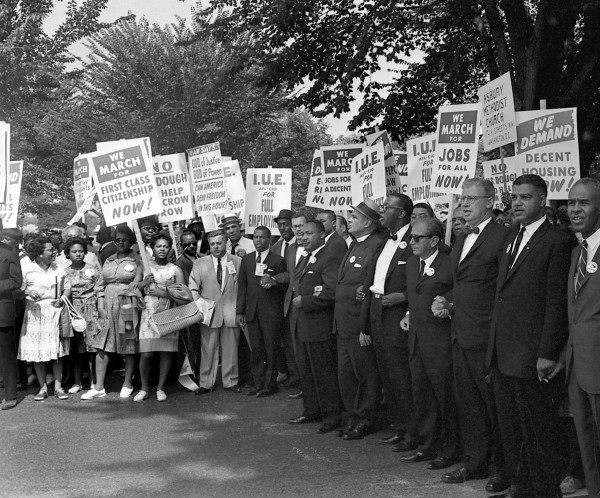
The Day CBS Forgot That King Was a Preacher
The decades-long career of network political correspondent Roger Mudd, who died Tuesday at 93, included covering the 1963 March on Washington for CBS.
Like many, he saw the March in political terms, saying later that the March sent a signal to the nation that the civil rights movement “as fractured as it had been through the South, was no longer a regional movement but a national movement. President Johnson was able to use (John Kennedy’s) assassination as a major lever to get the Civil Rights Bill through. I don’t think any of that would have happened without the March being as successful as it was.”
Mudd would write later that his career was on the line that day, but as it turns out, his CBS colleagues missed the event’s most memorable speech, Martin Luther King Jr.’s “I Have a Dream” speech.
According to Aniko Bodroghkozy, writing in “Equal Time: Television and the Civil Rights Movement,” “part of the answer must be the sheer unfamiliarity with the ‘I have a dream’ part of the address, which wasn’t in the prepared text.
“When King launched forth into this oration, he was no longer giving a speech, he was preaching; he was giving a sermon. Of course everyone, news reporters and the general public, understood that King was a clergyman. But as far as the news media was concerned, King was primarily a political leader. He commanded a political movement and met regularly with White House and other elected officials. . . .
“Outside the movement, most Americans had never heard King deliver a sermon. When King left his prepared address, he left behind the persona most familiar to media audiences and he put on his preacher persona.
“Suddenly, ‘he no longer sounded like President Kennedy, John Lewis or any other orator of the era. He sounded like Isaiah, the great visionary prophet of ancient Israel.’ “
Bodroghkozy points out that The Washington Post and the Chicago Defender made the same mistake.
“One week later, having heard from hundreds of readers, the Defender noted its error, informed readers that because of the stepped-up publishing schedule, it had printed an advanced press release. . . . the paper reprinted the speech in its entirety and urged readers to save it for their grandchildren.”
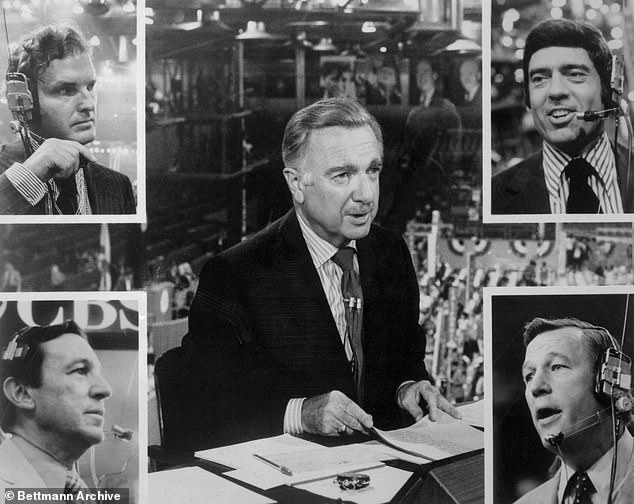
. . . Mudd Knew Who Formed the Bedrock of D.C.
Roger Mudd was born and raised in the District of Columbia, and he was irked by those — mainly his fellow whites from elsewhere — who say that “no one is really from” D.C. They are oblivious to the many African Americans who for generations have staffed the federal bureaucracy and those in a symbiotic relationship with it.
And in his 2008 autobiography, “The Place to Be: Washington, CBS, and the Glory Days of Television News,” Mudd blamed the news media.
“No one ever being born and raised in Washington is a myth believed mostly by people far beyond the city,” Mudd wrote, “who read their papers and watch their television and assume the place is inhabited only by presidents and politicians who come and go every two, four or six years, by foreign diplomats who come to Washington as their last crowning assignment before retirement, and by admirals and generals who arrive only toward the end of their careers.
“The local press, particularly the Washington Post and the late lamented Evening Star, reinforced the myth because their coverage tended to concentrate on the city’s transient social and power elite.
“But when Washington became a predominantly black city, the Post — prodded by black protests against its earlier non-coverage — tried to compensate.”
It wasn’t just people of color who seemed invisible, Mudd wrote. “There are thousands of us — mainly white — who have never known another hometown, who didn’t migrate from the South or the Midwest during World War II but who are rarely written about in the local papers and who rarely exist on television.”
In fact, according to the D.C. Office of Planning, citing figures from 2019, 75.5 percent of Black D.C. residents were born in the city, but only 16.6 percent of whites were.
Which group is writing the headlines?
- Tara Lerman, Greater Greater Washington: Let’s stop saying nobody is actually from DC (2017)
To subscribe at no cost, please send an email to journal-isms+subscribe@groups.io and say who you are.
Facebook users: “Like” “Richard Prince’s Journal-isms” on Facebook.
Follow Richard Prince on Twitter @princeeditor
Richard Prince’s Journal-isms originates from Washington. It began in print before most of us knew what the internet was, and it would like to be referred to as a “column.” Any views expressed in the column are those of the person or organization quoted and not those of any other entity. Send tips, comments and concerns to Richard Prince at journal-isms+owner@
View previous columns (after Feb. 13, 2016).
View previous columns (before Feb. 13, 2016)
- Diversity’s Greatest Hits, 2018 (Jan. 4, 2019)
- Book Notes: Is Taking a Knee Really All That? (Dec. 20, 2018)
- Book Notes: Challenging ’45’ and Proudly Telling the Story (Dec. 18, 2018)
- Book Notes: Get Down With the Legends! (Dec. 11, 2018)
- Journalist Richard Prince w/Joe Madison (Sirius XM, April 18, 2018) (podcast)
- Richard Prince (journalist) (Wikipedia entry)
- February 2018 Podcast: Richard “Dick” Prince on the need for newsroom diversity (Gabriel Greschler, Student Press Law Center, Feb. 26, 2018)
- Diversity’s Greatest Hits, 2017 — Where Will They Take Us in the Year Ahead?
- Book Notes: Best Sellers, Uncovered Treasures, Overlooked History (Dec. 19, 2017)
- An advocate for diversity in the media is still pressing for representation, (Courtland Milloy, Washington Post, Nov. 28, 2017)
- Morgan Global Journalism Review: Journal-isms Journeys On (Aug. 31, 2017)
- Diversity’s Greatest Hits, 2016
- Book Notes: 16 Writers Dish About ‘Chelle,’ the First Lady
- Book Notes: From Coretta to Barack, and in Search of the Godfather
- Journal-isms’ Richard Prince Wants Your Ideas (FishbowlDC, Feb. 26, 2016)
- “JOURNAL-ISMS” IS LATEST TO BEAR BRUNT OF INDUSTRY’S ECONOMIC WOES (Feb. 19, 2016)
- Richard Prince with Charlayne Hunter-Gault,“PBS NewsHour,” “What stagnant diversity means for America’s newsrooms” (Dec. 15, 2015)
- Book Notes: Journalists Follow Their Passions
- Book Notes: Journalists Who Rocked Their World
- Book Notes: Hands Up! Read This!
- Book Notes: New Cosby Bio Looks Like a Best-Seller
- Journo-diversity advocate turns attention to Ezra Klein project (Erik Wemple, Washington Post, March 5, 2014)
.

